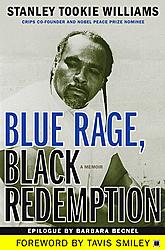Blue Rage, Black Redemption

In the midst of our current pop culture’s street gang glamorization and mafia worship, the Nobel Prize-nominated work of late Crips gang founder Stanley “Tookie” Williams is a flash of clarity and a voice of reason. Executed in 2005 for the murder of four people, Williams claimed his innocence until the end. Perhaps even more importantly—and certainly the legacy we hope he is remembered for—Williams was believed to have been reformed as he spent much of his sentence in California’s San Quentin prison writing and working on peace plans for our badly torn nation. In a remarkable turn, during his incarcerated years, Williams was one of the most outspoken and leading critics of gang violence in America, nominated for multiple Nobel Peace prizes and Nobel Prizes in literature, encouraging youth to stay clean through his own testimonies of life on the streets of South Central Los Angeles.
Blue Rage, Black Redemption is Williams’ memoir, of sorts—a thorough, educational tale of his life in inner city Los Angeles after a childhood move west from New Orleans, written in accessible language that could be understood by almost anyone. Williams details his childhood friendships, his conflicts with his well-meaning mother, and his eventual rise to power in his part of town through his understanding that power could solve his problems. Throughout this tale, Williams also explains how he came to understand his Black heritage and all the subconscious problems his oppression brought, culminating is gang warfare and his eventual understanding of racism as it plays out in the lives of many young men of color. He also details his time behind bars as a lesson for those who could also end up there. This edition even includes photos, prison documents, and a book club reading guide and questions for readers answered by Williams’ co-author and friend Barbara Becnel.
I suspect there are few of us who could live with such vision while under a controversial death sentence, and that in itself speaks volumes about Williams’ work. A bittersweet posthumous edition with a new foreword by Tavis Smiley, this is a narrative full of hope and promise in the face of defeat.